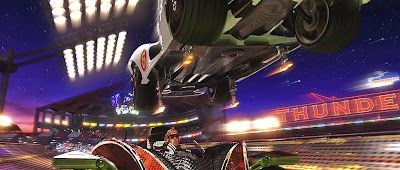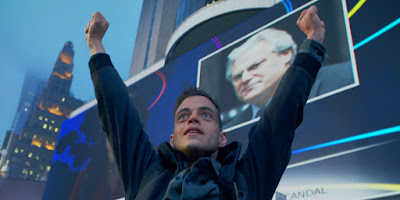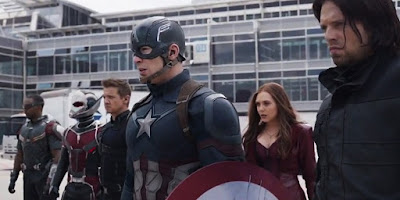'Speed Racer' - Ten Years Later
With the heavily maligned 2008 film Speed Racer marking its ten-year anniversary today, the ambitious adaptation from the Wachowski siblings came charging through theaters just one decade ago, its splashy color palette and 1960s anime-inspired filmmaking on full and startling display. Looking back at the feature now, even as it stands as one of the major examples of the infamous "white-washing" epidemic that still haunts Hollywood today, the revamped take on the 1960s manga produced one of the Matrix filmmakers' most eye-catching endeavors. Mixing the campiness and obscurity of the cartoon with a mildly-intoxicating racing adventure, here are my thoughts on Speed Racer, ten years later.
While I was only around nine years old at the time the Wachowskis' Speed Racer hit theaters, 2008 was an intriguing year for film. As superhero franchises took off with The Dark Knight and Iron Man, and animated hits in WALL-E and Kung Fu Panda thrived, the age of adaptations in Hollywood still sought to bring unique and popular stories to the big screen. As the prospects of capitalizing on a bankable product by transferring it to the silver screen challenged numerous directors, a handful of adaptations began to crop up. From action-thrillers like Doug Liman's Jumper to acclaimed dramas in Danny Boyle's Slumdog Millionaire, Hollywood found varying degrees of success in digging up the past. One such project, which ignited from the duo behind the 1999 knock-out The Matrix, was May's Speed Racer.
Based on the popular 1960s manga and anime of the same name, created by anime pioneer Tatsuo Yoshida, Speed Racer sped into theaters just a few years after the racing-based series spawned a number of projects across the sea in America. While none of its American enterprises lasted very long, from its run in comics to its numerous television reboots, the concept still managed to make its way to larger formats, as the 2008 film spun out a very Americanized version of Yoshida's creation. Telling the tale of young racer, Speed, and his journey towards stardom alongside a vibrant cast of characters including his spirited family, the film was promised to be the perfect summer flick to draw in a wide range of audiences. With a likable-enough cast, a barreling and glitzy adventure, and a directing duo known for their bold visual style, what could possibly go wrong?
While at the time of its release I might not have payed any attention to what the critics were saying about the adaptation, looking back on the film, it's definitely difficult to see Speed Racer as anything beyond a visual extravaganza with little substance beneath. While my childhood eyes adored the film, obviously, and my memory of my initial thoughts are hidden somewhere in my dwindling attention span, watching the film as an almost adult brought me back to not only some of the major issues with the film, but also the things I loved most about it. While critics of the time plagued the film with negative notions concerning its storyline, dialogue, characters, and overall visual style, there remain snippets of greatness which paint Speed Racer as a zany and incredibly enjoyable hit.
Before I detail the positives of the film, I'll delve first in just why critics have scorned the film for years since 2008. Of course, one of the main reasons found itself in the so-called "Americanization" of the premise and its characters. While there remain some roots to its Japanese origins, the directors banked on a mostly all-white cast to sell the film. While the cast did fine in my eyes, securing a somewhat promising lead in Emile Hirsch as Speed, and filling the background with campy personas that aid in establishing the animated tone of the film, the project still stands an obvious example of "white-washing". As critics back in 2008 ate up the film, only to quickly spit it out, the film was brought down by those who held onto the Japanese roots and advocated for a culturally-accuate portrayal.
Aside from its majority-white cast, the film also suffered from a lack of true depth in its storytelling. Even while it yearned to craft a complex plot full of corrupt enterprises, deceased relatives, and a boy and his chimp, the majority of the film filled its time with a vast color palette of high-octane and highly unpractical automotive racing. While Speed's journey towards fame and fortune lied at its heart, the film juggled a messy lot of storylines in effort to keep the audience guessing. As its mystery played out alongside its headache-inducing auto-show, Speed Racer presented a pretty slim-veiled premise, one that while not nearly as complex as it could've been, managed to keep the film relatively grounded for the most part.
Onto the positive aspects of the film, watching Speed Racer today showcased it not only as a master class of editing and visual style, but also a film that never took itself too seriously. While the film admittedly tossed much of its cash into sometimes over-bloated CGI work, creating a mishmash of whimsical costumes and absurd colors, the film composed the majority of its shots to replicate its manga origins. Making for an exciting, fast-paced set of transitions between everything from its action scenes to the rapid-fire exchanges between characters, Speed Racer took a page from its Japanese roots and ran with it, to a mostly impressive final result. Going back to the film's tone, another element I enjoyed from the film was its aptness to be absurd. In a premise that encouraged a campy feel to the film, especially with a lead character with a name like Speed Racer, the Wachowskis didn't hold back on reveling in the light-hearted nature of the project. While it struggled at times to deliver any lasting emotional significance, Speed Racer was always meant to be an obscure pulp fiction set against a motley crew of unserious stereotypes.
Despite its various issues, which cropped up in its thin storytelling and somewhat compromising casting choices, 2008's Speed Racer still holds a draw for fans who can find joy in the Wachowskis' bold visual style. In a film that you can't take too seriously most of the time, and which might give you a headache if you stare at its rip-roaring racing scenes for too long, Speed Racer was an ambitious adaptation for its time, seeking to take an iconic franchise and turn it into a splashy Warholian thrill-ride.
What are your thoughts on 2008's Speed Racer? Where do you place it in the list of live-action manga/anime adaptations, from Dragonball: Evolution to the more recent Ghost in the Shell? Let me know in the comments below, and stay tuned for the next project I reflect on from the past.
Onto the positive aspects of the film, watching Speed Racer today showcased it not only as a master class of editing and visual style, but also a film that never took itself too seriously. While the film admittedly tossed much of its cash into sometimes over-bloated CGI work, creating a mishmash of whimsical costumes and absurd colors, the film composed the majority of its shots to replicate its manga origins. Making for an exciting, fast-paced set of transitions between everything from its action scenes to the rapid-fire exchanges between characters, Speed Racer took a page from its Japanese roots and ran with it, to a mostly impressive final result. Going back to the film's tone, another element I enjoyed from the film was its aptness to be absurd. In a premise that encouraged a campy feel to the film, especially with a lead character with a name like Speed Racer, the Wachowskis didn't hold back on reveling in the light-hearted nature of the project. While it struggled at times to deliver any lasting emotional significance, Speed Racer was always meant to be an obscure pulp fiction set against a motley crew of unserious stereotypes.
Despite its various issues, which cropped up in its thin storytelling and somewhat compromising casting choices, 2008's Speed Racer still holds a draw for fans who can find joy in the Wachowskis' bold visual style. In a film that you can't take too seriously most of the time, and which might give you a headache if you stare at its rip-roaring racing scenes for too long, Speed Racer was an ambitious adaptation for its time, seeking to take an iconic franchise and turn it into a splashy Warholian thrill-ride.
What are your thoughts on 2008's Speed Racer? Where do you place it in the list of live-action manga/anime adaptations, from Dragonball: Evolution to the more recent Ghost in the Shell? Let me know in the comments below, and stay tuned for the next project I reflect on from the past.







Comments
Post a Comment